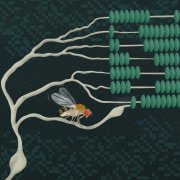May 6, 2025 - 4:00 pm
Singleton Auditorium (46-3002)
Nidhi Seethapathi, MIT
TBA
April 25, 2025 - 4:00 pm
McGovern Reading Room (46-5165)
Adi Shamir, The Paul and Marlene Borman Professorial Chair of Applied Mathematics, Weizmann Institute of...
TBA
March 6, 2025 - 9:30 am
Singleton Auditorium (46-3002)
Kelsey Allen, DeepMind
Abstract: Every human culture we know of creates and re-purposes objects as tools to achieve their goals. These capabilities come so easily to us that we often forget how complex these behaviors are. Despite the universality of tool use in people, only a handful of other animals use objects in this...
March 4, 2025 - 4:00 pm
Singleton Auditorium (46-3002)
Joel Leibo, senior staff research scientist at Google DeepMind and professor at King's College London
Abstract: What is appropriateness? Humans navigate a multi-scale mosaic of interlocking notions of what is appropriate for different situations. We act one way with our friends, another with our family, and yet another in the office. Likewise for AI, appropriate behavior for a comedy-writing...
February 11, 2025 - 4:00 pm
Singleton Auditorium (46-3002)
Thomas Serre, Brown University
Abstract: Recent advances in artificial intelligence have been mainly driven by the rapid scaling of deep neural networks (DNNs), which now contain unprecedented numbers of learnable parameters and are trained on massive datasets, covering large portions of the internet. This scaling has enabled...
December 3, 2024 - 4:15 pm
Singleton Auditorium (46-3002)
Kelsey Allen, Deep Mind
This event has been cancelled.
Kelsey Allen is a Senior Research Scientist at Deepmind. Her work surrounds cognitive science, machine learning, and robotics, with a focus on tool use and tool creation.
Kelsey Allen is a Senior Research Scientist at Deepmind. Her work surrounds cognitive science, machine learning, and robotics, with a focus on tool use and tool creation.
October 1, 2024 - 4:00 pm
Singleton Auditorium (46-3002)
Noah Goodman, Stanford University
Noah Goodman is a Professor of Psychology and Computer Science at Stanford University. His research surrounds computational models of cognition, cognitive development and social cognition, and probabilistic programming languages.
September 10, 2024 - 4:00 pm
Singleton Auditorium (46-3002)
Michael Littman, Brown University
Abstract: It is immensely empowering to delegate information processing work to machines and have them carry out difficult tasks on our behalf. But programming computers is hard. The traditional approach to this problem is to try to fix people: They should work harder to learn to code. In this talk...
May 7, 2024 - 4:00 pm
Bruno Olshausen, UC Berkeley
Abstract: The goal of building machines that can perceive and act in the world as humans and other animals do has been a focus of AI research efforts for over half a century. Over this same period, neuroscience has sought to achieve a mechanistic understanding of the brain processes underlying...
April 18, 2024 - 11:00 am
Online Webinar
Amnon Shashua, Sachs Professor of Computer Science at the Hebrew University of Jerusalem, Founder & CEO,...
*Event time is 11:00pm EDT / 5:00pm CET - Registration required!*
Register for the event here.
Join us on a journey through the history of artificial intelligence (AI) from its early conceptual foundations to today’s Gen AI breakthroughs and tomorrow’s potential futures with:
Amnon Shashua, Sachs...
Register for the event here.
Join us on a journey through the history of artificial intelligence (AI) from its early conceptual foundations to today’s Gen AI breakthroughs and tomorrow’s potential futures with:
Amnon Shashua, Sachs...
April 2, 2024 - 4:00 pm
Singleton Auditorium (46-3002)
Melanie Mitchell, Santa Fe Institute
Abstract: I will survey a current, heated debate in the AI research community on whether large pre-trained language models can be said to "understand" language—and the physical and social situations language encodes—in any important sense. I will describe arguments that have been made for and...
March 26, 2024 - 4:00 pm
Singleton Auditorium (46-3002)
Giorgio Metta, Istituto Italiano di Tecnologia (IIT)
Abstract: The iCub is a humanoid robot designed to support research in embodied AI. At 104 cm tall, the iCub has the size of a five-year-old child. It can crawl on all fours, walk, and sit up to manipulate objects. Its hands have been designed to support sophisticate manipulation skills. The iCub...
March 12, 2024 - 4:00 pm
Singleton Auditorium (46-3002)
Tom Griffiths, Princeton University
Abstract: Recent rapid progress in the creation of artificial intelligence (AI) systems has been driven in large part by innovations in architectures and algorithms for developing large scale artificial neural networks. As a consequence, it’s natural to ask what role abstract principles of...
February 14, 2024 - 2:00 pm
Singleton Auditorium (46-3002)
Alexander Borst, Max-Planck-Institute for Biological Intelligence, Martinsried, Germany
*Due to the forecast weather event for Cambridge, MA on Tuesday February 13th, this talk will be held on Wednesday February 14th at 2:00PM*
Abstract: Detecting the direction of image motion is important for visual navigation, predator avoidance and prey capture, and thus essential for the survival...
Abstract: Detecting the direction of image motion is important for visual navigation, predator avoidance and prey capture, and thus essential for the survival...
February 6, 2024 - 4:00 pm
Singleton Auditorium (46-3002)
Yael Niv, Princeton University
Abstract: No two events are alike. But still, we learn, which means that we implicitly decide what events are similar enough that experience with one can inform us about what to do in another. Starting from early work by Sam Gershman, we have suggested that this relies on parsing of incoming...















